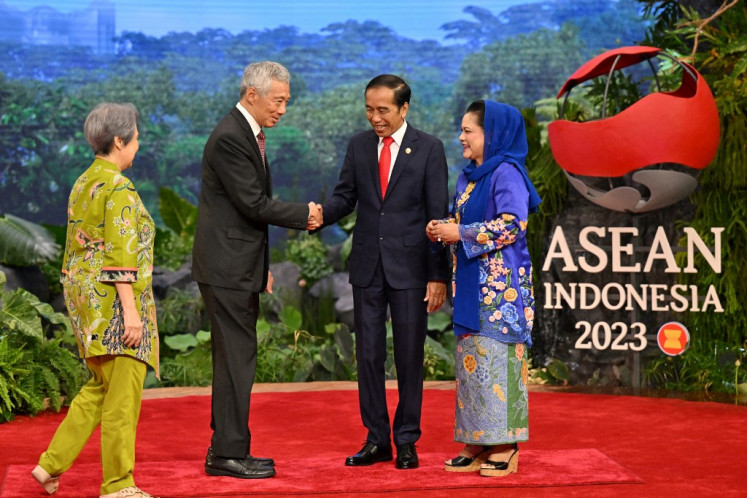A global protocol against incitement of hatred urgent
Observing the aftermath of the attack on Charlie Hebdo is akin to watching a rerun of a TV series whose plot we know all too well
Change Size

O
bserving the aftermath of the attack on Charlie Hebdo is akin to watching a rerun of a TV series whose plot we know all too well. Similar patterns have occurred several times, such as the backlash over the Jylland Posten Prophet Muhammad cartoon fiasco in 2006 and the Innocence of Muslims film controversy in 2012. In all of these cases, the ensuing fury led to many unnecessary deaths, as well as expanding the schism between Islam and the West.
On one side, the West seems to be more emboldened in defending freedom of speech while being oblivious to the ferocious uproar that may arise out of the abuse of such freedom. On the other hand, the 'provocative' arts affirm the conviction of some hardliners in the Muslim world that the West is hell-bent on assaulting their way of life, and that they ought to stand up for it, even by raising arms.
With this mutual demonizing and self-righteousness, the greatest tragedy of all is that it might only be a matter of time before another inflammatory piece of art explodes into violence.
The grievances of the Muslim community are made worse when the West seemingly applies a 'double standard', where mockery of Judaism bears a negative 'anti-Semitism' mark, while ridicule of Islamic practices are justified under the banner of free speech. Indonesian religious intellectuals happen to share such resentment, as in a recent public discussion concerning freedom of expression that was initiated by Muhammadiyah, a prominent religious organization in Indonesia.
The international community has deplored the attack on Charlie Hebdo, but it is not enough. They should strive to prevent such bloodshed from recurring. A global dialogue involving government officials, media, artists, religious figures and other stakeholders might be worth considering. One of the tasks of such a forum would be to do something, which until now has proven elusive, to draw a line between freedom of speech and hate speech in the form of a global protocol against incitement of hatred.
To this end, the global community can refer to international human rights legal instruments, as well as jurisprudence, state practices and publications, to seek guidance in drafting such a protocol.
As a starting point, Article 19 and 20 of the International Covenant on Civil and Political Rights (ICCPR) allow state parties to enact laws that limit the freedom of expression to ensure respect of the rights and reputation of others, as well as protecting national security, public order, public health or morals. It also requires the prohibition of advocacy of national, racial or religious hatred that constitutes incitement to discrimination, hostility or violence. Furthermore, the covenant stipulates that the right to freedom of expression entails special duties and responsibilities.
Our way forward is to draw up robust definitions of ambiguous terms contained within the article, such as 'protection of public order', 'advocacy of religious hatred', 'incitement to discrimination' and the 'special duties and responsibilities' one must bear in exercising freedom of expression. The Camden Principles might be one of the references to deliberate this matter. For instance, the principles define incitement as 'statements about national, racial or religious groups that create an imminent risk of discrimination, hostility or violence against persons belonging to those groups'.
Judicial decisions can also shed some light on responsibilities entailing the freedom of expression. For example, the European Court of Human Rights deems that such rights entail 'an obligation to avoid as far as possible expressions that are gratuitously offensive to others'. Unambiguous definition to differentiate genuine exercise of freedom of expression from incitement to religious hatred is vital to ensure that laws against hate speech cannot be misinterpreted for ill purposes, such as imprisoning journalists and political opponents.
Restraint from ridiculing faith should not be considered as bowing to extremism, but rather seen as an act of respect, wisdom and maturity. The last thing we want is to stifle constructive interfaith dialogue, or stand in the way of healthy discussion of religion. The global protocol would only ban derogatory attacks that do nothing to promote tolerance and mutual understanding, while encouraging people to express their opinions in an educated and elegant manner.
Drawing a threshold for freedom of expression does not mean that we give people free pass to attack others who create something they deem offensive. We should still rightly condemn and punish those who commit violence against others.
We cannot bring back the lives of the Charlie Hebdo cartoonists or the protesters, but we must do everything in our power to avert such atrocities from occurring ever again. Otherwise, no matter how many times we shout 'Je suis Charlie,' we have let their demise and sacrifice be in vain.
_________________
Laws against hate speech cannot be misinterpreted for ill purposes.
_________________
The writers work for the Foreign Ministry. The views expressed are their own.









